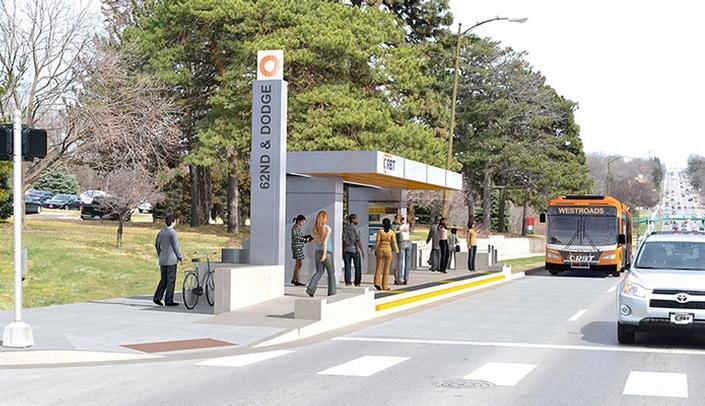Cars have dominated transportation in Omaha, with many familiar with the “20-minute commute.” As the city/metro area continues to expand, that commute is taking longer for many, increasing pollution and negatively impacting our health and the environment around us.
The new Omaha Rapid Bus Transit, ORBT, is in the final stages of preparation. Currently, all westbound stations are installed, and five of the 10 eastbound stations are complete. Final testing is under way in preparation for a fall 2020 launch. ORBT will help Omaha to have an interconnected, fast and reliable public transportation network. ORBT will connect with other bus stops to make the transition as smooth as possible.
Public transit connects people to the places they need to be, and ORBT stops at highly trafficked destinations, including the med center, the University of Nebraska at Omaha, Midtown Crossing and downtown Omaha, among others. Bus lines need to be accessible to people, and urban sprawl makes that challenging.
The Missing Middle Housing campaign focuses on policies and rezoning that will increase housing diversity and density in Omaha. Strong Towns, an organization dedicated to finding ways to rebuild American cities’ prosperity, notes single-family detached housing makes up “60% of the U.S. housing stock, and occupy over 80% of the land in most cities.” Changing the zoning to put in duplexes, triplexes, townhouses and mixed-use housing/retail buildings will increase density and be a way to live closer to places that people live, work and play. The Blackstone District is a good example of this practice.
Omaha has proposed bike lanes from 16th to 24th streets and from 10th Street to Turner Boulevard, and changes to the city’s zoning laws near the ORBT line to increase density. These proposed changes and improvements to transit will increase density and make movement around Omaha easier and active.
All of these changes can help us to be healthier. Air pollution from motor vehicles causes adverse cardiovascular and respiratory health effects. However, using public transportation reduces the amount of pollution while helping keep people physically active. The American Heart Association found that people who ride the bus to work were 44% less likely to be overweight, 27% less likely to have high blood pressure and 34% less likely to have diabetes.
TravelSmart can assist you in your health goals by providing free bus rides, which will include ORBT, free amenities to cyclists and walkers, and free parking for carpoolers.
